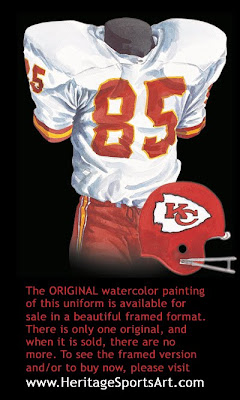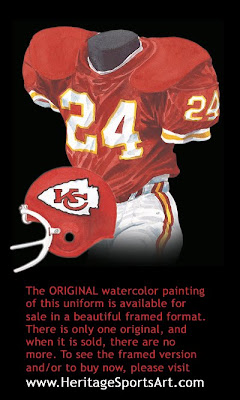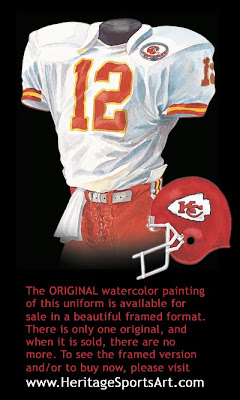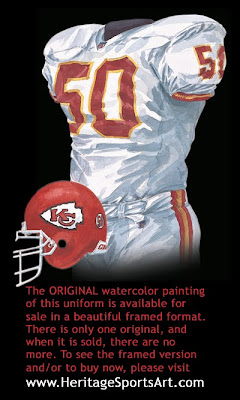
Please click on the evolution of the Chiefs uniform poster above for a close-up version of the poster. The descriptions below give you some insight and background about the uniforms and/or eras depicted in the poster.
Fall 2022: To purchase a reasonably priced 8" x 24" plaqued mounted version of the Chiefs poster that's ready to hang on your wall, please visit Heritage Sports Stuff.
1962
The Kansas City Chiefs began life as the Dallas Texans when the AFL began in 1960. In 1959, a 26-year-old Texan, frustrated in his attempts to gain an NFL franchise, embarked on an alternate course that would drastically change the face of pro-football. Lamar Hunt founded the American Football League and served as its first president when eight new teams began play in 1960.
Joining the AFL as charter members were the: New York Titans (now Jets); Dallas Texans (now Kansas City Chiefs); Denver Broncos; Los Angeles Chargers (now San Diego Chargers); Houston Oilers (now Tennessee Titans); Boston Patriots (now New England Patriots); Buffalo Bills; and the Oakland Raiders.
The Texans finished the regular season with an 11-3 record, and after only two seasons in the league, won the AFL Championship. In the final game, played on December 23rd in Houston at Jeppesen Stadium before 37,981 fans, the Texans won 20-17 in double overtime.
The Chiefs had a strong offence, and it was proven when Abner Haynes became the first player to rush 1,049 yards.
This white away jersey with the red numbers outlined in yellow on the chest and arms matches the red helmet which outlines Texas. Notice the stripes of red and orange on the side of the legs.
-------------------------------------------------------------------------------------------------
1963
After three successful seasons in Dallas, owner Lamar Hunt decided that the team would be better ff if he moved them to Kansas City. Therefore they moved, and through a fan contest, the name Chiefs was selected as the team name. In the teams first year of play in KC, they went 5-7-2 and were led by QB Len Dawson and R Chris Burford.
This red home jersey is a duplicate of the previous years jersey. Note that the helmet has changed. Instead of the map of Texas, there is now the Chiefs logo on the side: an arrowhead and “KC” on the side of the helmet.
-------------------------------------------------------------------------------------------------
1966
The period of time between 1966 and 1969 warrants a bit of explanation. The 8 team AFL began in 1960 as a rival league to the NFL - both leagues competed head to head for players, fans and TV revenue. And thus it was for 5 years - two separate leagues, two separate champions (although few people would have honestly believed that the AFL champion could have beaten the NFL champs). Then in 1965 the two leagues agreed to merge. It was decided that beginning in 1970 there would be only one league, the NFL, and that between 1966 and 1969 the AFL Champion would play the NFL Champion for the “World Championship”. It was only after the first World Championship had been played in 1966 that the name “Super Bowl” came into being.
The Chiefs were led by QB Len Dawson who passed for 2527 yards and 26 td’s, and suffered 23 sacks.
RB Mike Garrett, in his rookie season, averaged 5.4 yards per carry, and in the following season he would rush for 1,000 yards.
In 1966, the Chiefs finished first in the AFL’s Western Division with an 11-2-1 record and would go on to crush the Buffalo Bills in the Championship game 31-7 in front of the Buffalo crowd. This then set the stage for the first ever meeting between the AFL Champions (in this case the Chiefs) and the NFL Champs (in this case the powerful Packers) in a “World Championship”.
The game was played in Los Angeles at the Memorial Coliseum on January 15th, 1967. Suffice to say that the Packers came out on top 35 -10. (Even though the game was played in 1967, most football historians refer to this as the 1966 Super Bowl because it was the culmination of the 1966 season.) The NFL superiority was on display again in 1967, when the NFL’s Packers pounded the AFL’s Raiders 33-14. Then came 1968 and the stunning upset - the AFL’s NY Jets shocked the football world by beating the NFL’s heavily favored Baltimore Colts 16-7.
This white away jersey has only one change – the sleeves. Note the changes on the helmet’s mask. The helmet also has the arrowhead and “KC” on it that the team would keep until the present day. We have also included the neck guard which many players in this era wore for additional protection.
-------------------------------------------------------------------------------------------------
1969
The period of time between 1966 and 1969 warrants a bit of explanation. The 8 team AFL began in 1960 as a rival league to the NFL - both leagues competed head to head for players, fans and TV revenue. And thus it was for 5 years - two separate leagues, two separate champions (although few people would have honestly believed that the AFL champion could have beaten the NFL champs). Then in 1965 the two leagues agreed to merge. It was decided that beginning in 1970 there would be only one league, the NFL, and that between 1966 and 1969 the AFL Champion would play the NFL Champion for the “World Championship”. It was only after the first World Championship had been played in 1966 that the name “Super Bowl” came into being.
As mentioned earlier, the 1966 season saw the AFL Chiefs fall 35-10 to the NFL’s Packers. The NFL superiority was on display again in 1967, when the Packers pounded the AFL’s Raiders 33-14. Then came 1968 and the stunning upset - the AFL’s NY Jets shocked the football world by beating the NFL’s heavily favored Baltimore Colts 16-7.
Thus the stage was set for the Super Bowl IV, the last meeting between the AFL and NFL Champions. Although the Chiefs finished the 1969 season in second place behind the Oakland Raiders in the AFL Western Division with an 11-3 record, they would go on a great playoff run. They took on the Jets first, beating them 13-6 in New York. Next up were the Raiders in Oakland for the AFL Championship. The Chiefs came out on top 17-7 and headed to their second Super Bowl (their first being the 1966 loss to the Packers).
Kansas City traveled to New Orleans on January 11th to play the Minnesota Vikings for Super Bowl IV and won their first championship 23-7 in front of 80,562 fans. MVP of the game was Chief’s QB Len Dawson.
This red jersey includes the addition of white and yellow stripes on the sleeves. The patch on the left shoulder celebrates the AFL’s 10th Anniversary, and features an “A” over an eagle that is holding on to a football.
-------------------------------------------------------------------------------------------------
1971
The Chiefs enjoyed success this season as they finished a top the AFC’s Western Division with a 10-3 record. They were led by quarterback Len Dawson who threw for over 2500 yards, and on the other end had Otis Taylor catching his passes for over 1100 yards.
The team went on to play the Dolphins in the AFC Divisional Playoffs, but fell to Miami 27-24 in double overtime. Place-kicker Jan Stenerud would remember this game not as a great playoff game, but as a “personal disaster”, as he missed a 32-yard field-goal attempt in the closing minute of the game. This would be the Chief’s last game ever played at Municipal Stadium.
This white jersey has red numbers on the front and sleeves. It also has red and yellow stripes on the sleeves. This is the first time we see red pants on the poster. The helmet has the arrowhead and “KC” on it that the team would keep until the present day. Note the change of the mask.
-------------------------------------------------------------------------------------------------
1976
The Chief’s fell on hard times in the ’70’s and this season was no different. With the firing of their long-time head coach Hank Stram two years prior with a 5-9 record, they finished the following year second from the bottom with a 5-9 record under the eye of Paul Wiggin. For the third year in a row, they finished the 1976 season with a 5-9 record, and wouldn’t make it back to the playoffs until the mid ‘80’s.
Although the team had a tough year, there were still a few players who shone. QB Mike Livingston passed for 2683 yards and 12 td’s, and was sacked 38 times.
This red home jersey has white numbers and yellow outlines, which are also on the sleeves. Note the change of the stripes on the sleeves from red and yellow to white and yellow. The helmet has the arrowhead and “KC” on it that the team would keep until the present day. Also note the change to the mask. More bars have been added for more protection. As well, we have added a neck guard, as most teams start to use them in this year.
-------------------------------------------------------------------------------------------------
1981
Although the Chiefs had a winning record this season going 9-7, they wouldn’t make it into the playoffs. This marked their first winning season since 1973 when they went 7-5. Future Hall of Fame Head Coach Marv Levy would end his five-year tenure with the Chiefs at the end of the following season.
The chief’s were led by QB Bill Kenney, who passed for 1983 yards and 9td’s.
Note the change on this red jersey, as the sleeves become shorter. The helmet has the arrowhead and “KC” on it that the team would keep until the present day.
-------------------------------------------------------------------------------------------------
1984
Once again the Chiefs fell on hard times with a losing record for the two previous seasons and would finish this year at 8-8. The teams punter Jim Arnold was kept busy this season with 98 punts for 4397 yards, tops in the NFL.
Note the colours of the stripes on the sleeves have been changed back of the red and yellow. Also, note the patch on the left shoulder of this white jersey. The patch celebrates the AFL’s silver anniversary from 1960 - 1984. The helmet has the arrowhead and “KC” on it that the team would keep until the present day.
-------------------------------------------------------------------------------------------------
1992
Kansas City rebounded this season in the AFC West finishing in second place with a 10-6 record. They would finish only second to the San Diego Chargers, whom they would face in the AFC Wild Card Game.
The game took place in San Diego on January 2nd, 1993 at the Jack Murphy Stadium in front of 58,278 fans. The game looked to be a defensive battle when the game was scoreless going into the half, until the hometown Chargers scored 17 points in the second half to advance to the next round and sending the Chiefs home for the summer.
A year earlier in 1991, Place-kicker Jan Stenerud was inducted into the Hall of Fame with a career total 1,699 points on 580 pat’s, and a then-record 373 field goals.
Note the patch on the left shoulder of this white jersey. The patch is in honor of the passing of the Chiefs Player Personnel Director Whitey Dovell.
The helmet has the arrowhead and “KC” on it that the team would keep until the present day. Note also the change of the mask.
If you look closely at this jersey, you will note a smaller patch the NFL shield on the jersey’s neckline. Most NFL uniforms added the NFL logo patch to the neck and upper left thigh of the pants beginning in 1991 - an exception being in 1994 when teams occasionally wore "throwback" uniforms celebrating the NFL's 75th anniversary.
-------------------------------------------------------------------------------------------------
1994
The Chiefs added future Hall of Famer Joe Montana to the roster for the 1993 season and made a run in the playoffs. Once again, the ’94 season saw Kansas City finish behind the San Diego Chargers with a 9-7 record.
They would play the Dolphins in the AFC Wild Card game on New Years Eve at the Joe Robbie Stadium in Miami in front of 67,487 fans. Unfortunately the Chiefs didn’t get the chance to celebrate that night as the “fish” toppled them 27-17.
Note the stripes on the sleeves are now gone, and there are two patches on this jersey. The one on the left shoulder celebrates the NFL’s 75th anniversary, and is known as a “throwback” jersey. Every NFL team wore a throwback jersey for one or more games during the 1994 season.
During this season, the NFL and its franchises were showcasing ‘throwback’ jerseys, or replicas of older uniforms to help commemorate the NFL’s 75th anniversary. The 75th anniversary was also commemorated by the diamond patch on the upper left part of the torso - this patch was worn on all 1994 jerseys whether they were "throwback" jerseys or not.
The patch on the right shoulder celebrates the Chiefs 35th anniversary.
The helmet has the arrowhead and “KC” on it that the team would keep until the present day.
-------------------------------------------------------------------------------------------------
1999
The Chiefs start this season with a new head coach, Gunther Cunningham, replacing Marty Schottenheimer and his 100-59-1 record. The team finished second once again with a 9-7 record and did not make it to the post season.
QB Elvis Grbac had a great year as he passed for 3389 yards and 22 td’s.
This red jersey with white numbers added white and yellow stripes on the sleeve. The patch on the left shoulder celebrates the Chiefs 40th anniversary. The helmet has the arrowhead and “KC” on it that the team would keep until the present day.
-------------------------------------------------------------------------------------------------
2000
Kansas City has once again fallen into the loss column as they finish the season with a 7-9 record and do not make it to the playoffs.
The next season would start with another head coach as they take on Dick Vermeil as their on field leader.
QB Elvis Grbac passed for 4169 yards and 28 td’s.
This white jersey with red numbers has an NFL patch on the neckline as well as the left thigh of the pants. The helmet has the arrowhead and “KC” on it, with the addition of the number 58 on it honoring the memory of Derrick Thomas who passed away in the off-season.
-------------------------------------------------------------------------------------------------
2007
Text not yet written.
-------------------------------------------------------------------------------------------------
Celebrate the Chiefs' uniform history by owning a piece of history:
If you love the Kansas City Chiefs and the history of the Chiefs franchise, you might really love to own an original piece of artwork celebrating the team's historic uniforms as seen in the poster at the top of this blog - you can actually own one of those original pieces of art! There are only 13 pieces of original art available for sale, and when these 13 are sold, that's it, they're all sold out.
These original watercolor paintings would make a great gift (birthday gift, anniversary gift, retirement gift, Christmas gift, etc.) for someone you love or even a great gift for yourself (one of these framed pieces would look fantastic in your home or office). Each piece can be bought one of three ways:
1. As unframed art that you could have framed or mounted yourself (the one on the left)
2. Framed in our "Classic" framed version (the middle version)
3. Framed in our "Deluxe" framed version (the version on the right)

If you would like more information about this great artwork including the three ways you could purchase each piece, please visit our Kansas City Chiefs YouTube video at www.youtube.com/watch?v=1LpFiU--H5w or go directly to the artwork website www.heritagesportsart.com/Kansas-City-Chiefs-c4/ where you can see and purchase the artwork.
And if someone you know loves the history of sports uniforms (but maybe another team) and loves great art, please let them know that we have over 1500 pieces of great original artwork for sale at www.heritagesportsart.com (all NFL teams, all MLB teams, all NHL teams, all CFL teams, select NCAA football teams) or check out each team's video at the Heritage Sports Art YouTube Channel www.youtube.com/user/ssillcox
And please search my blog archive http://heritagejerseys.blogspot.com/ for other blogs on the history of the Chiefs.
---------------------------------------------
This blog was written by Scott Sillcox and was last updated August 17, 2010. I have tried to ensure the accuracy of the information, but I am human and can make mistakes. If you believe I have made a mistake, please let me know by email at ssillcox@rogers.com !
Many thanks!!!
Scott













No comments:
Post a Comment
Thank you for taking the time to add a comment - all input is welcome, especially the constructive kind! All the best - Scott